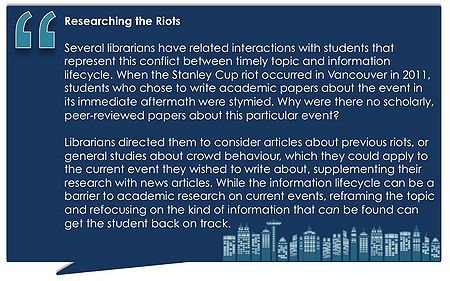Library:Faculty Information Literacy Toolkit/Finding
Finding
In the spring of 2013, learning and assessment librarians from the UBC Library met with groups of first year students to ask them about their experience and understanding of research as their first term of studies drew to a close. The conversations between the students and librarians revealed quite a lot about how students approach research at the beginning of their academic careers.
There are five fundamental elements to the research skills students need to learn in order to succeed in first year and beyond. This video introduces the element of finding information.
Finding here refers to locating resources. This will involve using both library and other sources, both physical and web-based. Keyword searching, browsing, and citation chaining may be among the strategies used in this element.
Tips to Address Finding Information
Source Types and Their Value to Assignment
Students have difficulty understanding the variety of information sources and why each would be used in a given situation (e.g. handbooks for overviews of a specific subject related topic). When discussing the information sources students will need for the assignments, explaining the value of the resource to their specific topic will assist students. You can:
- Help students understand that useful sources may look vastly different depending on the discipline/topic.
- Make your definitions clear: what constitutes a “scholarly” or “empirical” source in your discipline? What does your field define as a “primary” source?
- Provide students with examples of articles that are appropriate in scholarship, tone, scope, topic coverage.
Encouraging Exploration
Starting with general reference sources, including credible websites, helps students gain knowledge about complex ideas and jargon heavy subject areas. Providing support for exploring these resources may help reduce the frustration students have with more dense peer review/scholarly journal articles and books and will assist more invested reading of this material.
Students are often unaware of disciplinary vocabulary and organization. Reference sources, glossaries, and specialized dictionaries are available for many subject areas through the UBC Library catalogue, Summon, and the Research Guides for each discipline and subject.
Help pages within databases are developed specifically to assist users in formulating effective searches. If there is a database(s) that you require students to use, direct them to the help and search tips pages. Some examples (generally reached by clicking "help" within the database interface):
- EBSCO Databases, such as Academic Search Complete or PsycINFO
- JSTOR
- ProQuest Databases, such Canadian Newsstand.
Limiting the use of freely available sources, such as Wikipedia, is almost an impossible task. Consider instructing students on how and when they can use freely available sources.
- Wikipedia on Wikipedia: Wikipedia's entry on using Wikipedia in scholarly research.
- Using Wikipedia for Academic Research: a video overview of when (and when NOT) to use Wikipedia for research.
Sources Available on the Topic

Students don't always fully understand the kinds of sources and content that they can and can’t expect to find in the academic literature.
The information lifecycle is the time it takes for an research to go from idea to publication. For academic scholarship, this can sometimes take several years.
Sometimes students don't recognize the time the information lifecycle takes; they don’t understand that while scholarly material on a very timely topic might not exist, there will be other places in the discourse where they can build connections that they can use to synthesize an argument about a current event. Similarly, this skill is important in data-based research (using related data, making inferences/applications).
Assisting students in considering whether the information content and format required for their research is readily available through the library or the open web can reduce a lot of confusion. One way to prepare is to work with your subject librarian during the assignment development phase to assist in focusing student expectation of available resources.